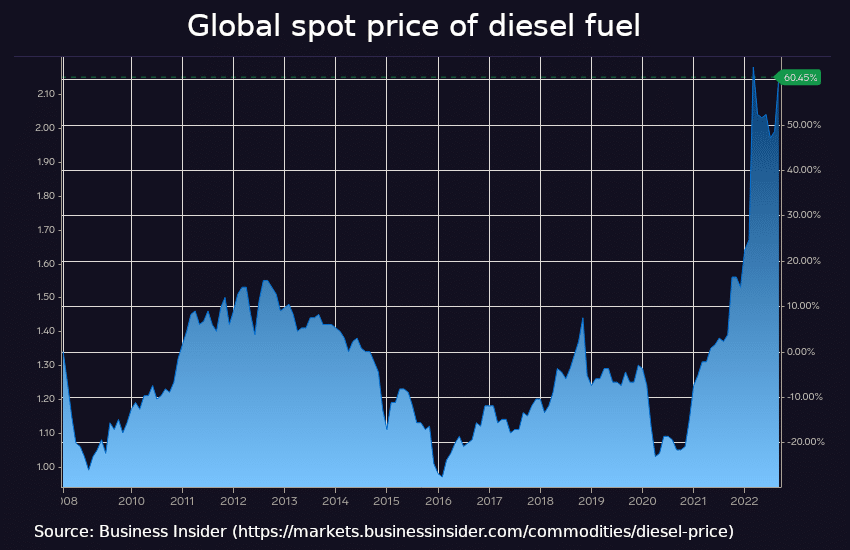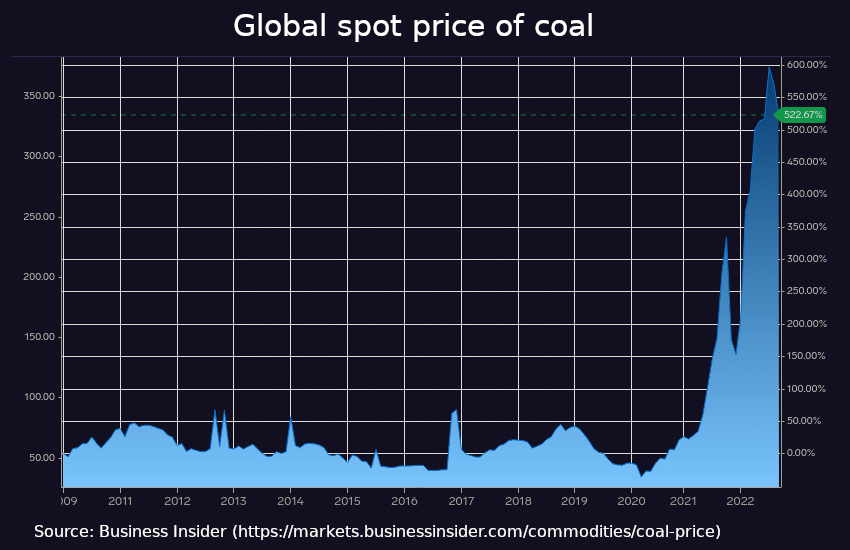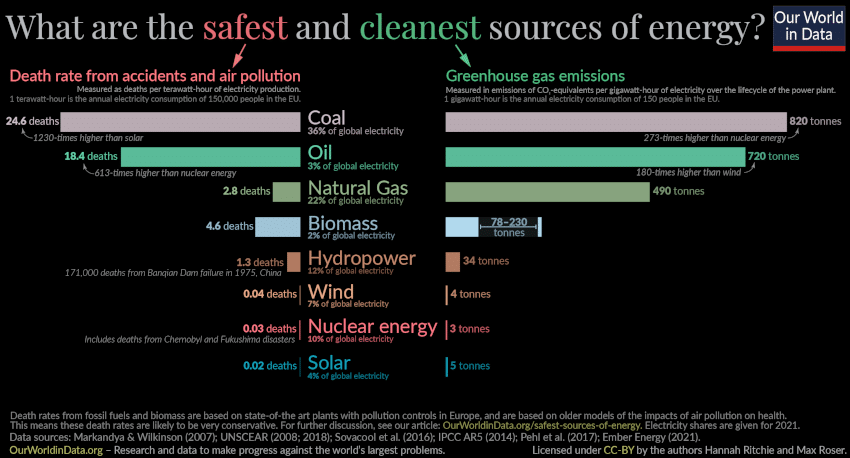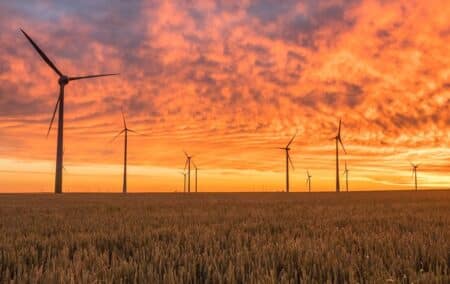Idealistic renewable energy policies and obstinate anti-nuclear sentiments are crumbling in the face of cold reality, as desperate countries turn to oil and coal. Pollution, emissions and deforestation are on the march again.
This week saw a warning over diesel prices in South Africa in the headlines.
The oil price is coming off its highest spike in a decade, and has returned to levels last seen before Russia invaded Ukraine, only about 20% above its average since the global financial crisis in 2008. As a result, petrol prices are set to decrease further, come October.
Not so for diesel, however. The diesel price will increase. This reflects a very high spot price for diesel fuel on the international markets. It is currently trading about 60% above its long-term average, and has not declined much from its post-invasion peak.

Faced with natural gas prices at their highest level in 14 years, and supply disruptions from Russia, countries like the Netherlands are stockpiling millions of barrels of diesel in preparation for a winter in which other energy sources will be severely constrained.
Private companies, too, are stocking up on diesel supplies in fear of high energy prices and shortages that might lead to blackouts in Europe.
Coal in high demand
Coal has seen an even more dramatic price increase, and it’s not because the cost of production has gone up.

Starting in 2021, well before the Russian invasion of Ukraine, the price of coal has run up to over five times its long-term average.
Despite all the lip service to ‘decarbonisation’ and ‘net zero by 2050’, coal demand rebounded sharply in 2021, and this year is set to return to its all-time high reached in 2013. Fuelled by increased demand, including in the green-minded European Union (EU), next year’s coal demand is expected to rise to levels never witnessed before.
As a result, carbon dioxide emissions from energy generation reached an all-time high in 2021, its rise exceeding the pandemic-induced decline of the previous year. It is expected to rise even further this year.
Tunnel vision
The consequences of a tunnel-visioned focus on unreliable wind and solar power, and especially the exclusion of nuclear power from green energy policies are now being felt.
All the money – trillions of dollars – thrown at a ‘green transition’ are coming to naught.
Had the world, and Europe in particular, committed to more nuclear power 20 years ago to provide a stable backbone for energy grids, they wouldn’t now be scrambling to buy up all the diesel and coal they can get their hands on.
The proximate cause for the high prices for fossil fuels is widely reported to be the supply crunch caused by sanctions on Russian exports. However, most fossil fuel prices began to rise well before the invasion of Ukraine, and are being exacerbated by increasing demand around the world.
‘The facts are stark,’ said then prime minister Tony Blair to the then leader of the opposition, David Cameron, in 2005. ‘By 2025, if current policy [on bot funding nuclear power] is unchanged, there will be a dramatic gap in our targets to reduce CO2 emissions and we will become heavily dependent on gas … If we don’t take these long-term decisions now we will be committing a serious dereliction of our duty to the future of this country.’
Blair wanted nuclear power to provide 40% of the UK’s energy requirements, up from 20%. Instead, the Conservative Party ignored the advice and, in desperate search of popularity, vowed to out-green the Labour Party.
It committed to phasing out coal, believing that gas and renewables would more than fill the gap. It subsidised wind and solar while denying nuclear power developments any government funding. It faced all the consequences Blair predicted.
Burning forests for fuel
In the UK and elsewhere in Europe, public opinion – fuelled by Russian disinformation – also turned against exploiting domestic gas resources, because of overwrought fears about hydraulic fracturing of gas-bearing shale beds. Those decisions, too, are coming back to bite them.
One of the perversities of the green energy movement is that burning biomass is, by some convoluted bit of rationalisation, considered to be ‘carbon neutral’. This is because forests can, in theory, regenerate themselves in mere decades or centuries.
Why carbon is better in the atmosphere than locked up in forests, I will leave as an exercise for those wiser in the ways of climate propaganda than I am.
The predictable effect, however, is widespread deforestation. Europe’s oldest forests, and forests around the world, are being hacked down to turn into wood pellets to fuel boilers to generate electricity that cannot be produced from coal, diesel, natural gas or nuclear energy.
Shunning nuclear
While Asian countries barrelled ahead with new nuclear builds, most European countries have slowed down, halted or reversed their nuclear energy programmes, largely due to environmental lobby group propaganda that cast the natural disaster at Fukushima not as evidence of the safety of nuclear power, but as evidence of its grave risks.
In fact, nuclear power is just as safe and green as wind or solar, albeit much more reliable. The return to coal, diesel, gas and biomass, by contrast, reverses the trend towards human safety and environmental soundness.

To make matters worse, energy companies themselves have redirected investment away from fossil fuels to renewable energy, believing that government interference in the market makes the eventual transition inevitable. They believe fossil fuel projects will struggle to attract financing, will compete on a playing field tilted against them, and face headwinds both from the public and from the courts. As a result, they have been slow to respond to the renewed demand for fossil fuels despite the fact that renewables simply are not producing suffiently abundant, sufficiently reliable and sufficiently cheap energy.
The soaring energy prices and looming shortages around the world are evidence that abundant, cheap energy is a core necessity to sustain modern living standards and combat poverty.
Degrowth
That goes to the core of the true agenda of environmentalists, however. Their goal is not (or is not only, if we’re being generous) to protect the environment. They are, for the most part, eco-socialists. They have a political and economic agenda. They would not be content with capitalist free markets provided that they minimised environmental harm.
They want energy scarcity, not energy abundance. They want degrowth, not economic growth. They think we are too prosperous, and ought to be content with far lower living standards.
‘We are in the beginning of a mass extinction and all you can talk about is money and fairy tales of economic growth. How dare you!’ said a teenage one-percenter, scowling at world leaders, in 2019.
Counter-productive
Politicians, of course, haven’t a clue what to do, and will invariably do the wrong thing. Take the EU, for example. They desperately want oil and gas companies to increase production. They fret about high energy prices, because high prices disgruntle voters.
So, what do they do? Instead of letting prices rise to signal consumers to economise on energy and incentivise producers to increase production, they propose to cap energy prices and punish producers with windfall taxes.
This is how they tell us they know nothing about economics without saying they know nothing about economics. The obvious consequence of this market interference will be over-stimulating demand and under-incentivising supply, making the shortage worse, not better.
Their interventions are entirely counter-productive. If I were king, I’d fire the lot of them for gross incompetence.
Amin H. Nasser, the CEO of the world’s largest energy company, Saudi Aramco, summed it up nicely when he said:
“Taxing companies when you want them to increase production is not helpful. Increases in oil and gas investments this year are too little, too late and too short-term. The response to the global energy crisis so far shows deep misunderstanding of how we got there.
“Capping energy bills might help consumers in the short-term, but is not a long-term solution. Even with strong economic headwinds, global oil demand is still fairly healthy today.
“The real causes of energy insecurity are under-investment in oil and gas, no ready alternatives and no back-up plan. When the global economy recovers, we can expect demand to rebound further eliminating the little spare oil production capacity out there.
“Even if the conflict in Ukraine ended today, the energy crisis would not end.”
No doubt, when the shortages get deeper and longer – as they must, given the interventions proposed – the politicians that broke the market will blame greedy capitalists.
Aspiring politicians should be required to read the article How Should Prices Be Determined? by Henry Hazlitt. If, that is, his short book Economics in One Lesson is not too much of a slog for the populist half-wits.
Cruel price
The world is paying a cruel price for dogmatic adherence to the agenda of renewable energy, and the obstinate refusal to invest in clean, green nuclear energy.
The effects are being felt not only in the wintry apartments of Europe, or at the fuel pumps in South Africa. The effects are being felt in the environment as pollution, carbon dioxide emissions and deforestation are on the march once again.
I bet the solar and wind warriors never thought their messianic fantasies of saving the planet would actually make the environment, and the people who live in it, worse off.
[Image: https://pixabay.com/photos/windmills-fields-sunset-clouds-sky-1838788/]
The views of the writer are not necessarily the views of the Daily Friend or the IRR
If you like what you have just read, support the Daily Friend

